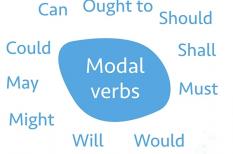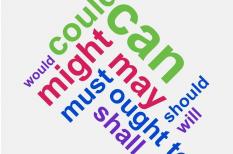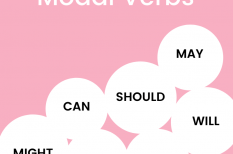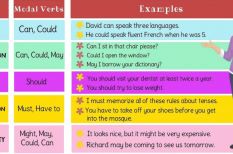Bạn đang bối rối bởi kiến thức rộng lớn về động từ khiếm khuyết? Cách tốt nhất để sử dụng thành thạo loại động từ này chính là làm thật nhiều bài tập đấy!
1. Bài tập 1
1.1. Complete these sentences with can / can’t, could / couldn’t or be able to (correct form). Sometimes it is possible to use more than one modal verb
1) Tom……………drive but he hasn’t got a car.
2) I can’t understand Martin. I’ve never……………….understand him.
3) He had hurt his leg, so he……………..walk very well.
4) She wasn’t at home when I phoned, but I……………..contact her at the office.
5) I looked very carefully and I……………see a figure in the distance.
6) I used to…………..stand on my head but I can’t do it now.
7) They didn’t have any tomatoes in the first shop I went to, but I……………get some in the next shop.
8) My grandmother loved music. She……………..play the piano very well.
9) Ask Ann about your problem. She should…………….help you.
10) The boy fell into the river but fortunately we……………..rescue him.
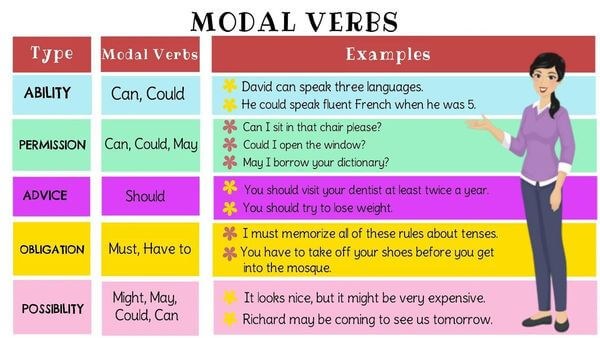
Bài tập luyện tập nhớ kiến thức về Modal Verb
1.2. Đáp án
1) can / is able to
2) been able to
3) couldn’t / wasn’t able to
4) was able to
5) could / was able to
6) be able to
7) was able to
8) could / was able to
9) be able to
10) were able to
2. Bài tập 2
2.1. Choose the correct answer
1) Which sentence is correct?
A. We should to leave soon.
B. We should leaving soon.
C. We should leave soon.
2) We………….visit Tom when we are in London
A. didn’t ought
B. ought
C. should
3) Which question is correct?
A. We should call the police?
B. Should we call the police?
C. Do we should call the police?
4) Which sentence is correct?
A. We ought have a party to celebrate Kate’s birthday.
B. We ought to have a party to celebrate Kate’s birthday.
C. We should to have a party to celebrate Kate’s birthday.
5) You…………..ride a motorbike without a helmet.
A. shouldn’t
B. ought
C. ought not
6) Which question is correct?
A. Ought we to tell Jane the news?
B. Ought we tell Jane the news?
C. We ought to tell Jane the news?
7) Which sentence is NOT correct?
A. Nick may have missed the train.
B. Nick must have missed the train.
C. Nick ought have missed the train.
8) Which sentence is NOT correct?
A. I may have left the form at home.
B. He can’t have got lost.
C. Joseph must have forget about the party.
9) We……………not have bought enough biscuits for everyone.
A. may
B. should
C. must
10) Which sentence means “Maybe John went to the shop”?
A. John might not have gone to the shop.
B. John may have gone to the shop.
C. John must have gone to the shop.
2.2. Đáp án
1) C 2) C 3) B 4) B 5) A 6) A 7) C 8) C 9) A 10) B
3. Bài tập 3
3.1. Rewrite the sentences
1. Perhaps Susan knows the address. (may)
=> Susan______________________________________________
2. It’s possible that Joanna didn’t receive my message. (might)
=> Joanna ______________________________________________
3. The report must be on my desk tomorrow. (has)
=> The report ______________________________________________
4. I managed to finish all my work. (able)
=> I______________________________________________
5. It was not necessary for Nancy to clean the flat. (didn’t)
=> Nancy______________________________________________
3.2. Đáp án
1. Susan may know the address.
2. Joanna mightn’t have received my message.
3. The report has to be on my desk tomorrow.
4. I was able to finish all my work.
5. Nancy didn’t need to clean the flat.
4. Bài tập 4
4.1. Find the mistake and correct them. If they correct, let them unchanged.
1. You must have be surprised when you heard the news.
2. You needn’t have do all this work.
3. The window must have been broken on purpose.
4. You must tired after working so hard.
5. One of the men may have died on the mountain.
6. You must been driving too fast.
7. The thief must have come in through the window.
8. If he is not in the office, he must at home.
4.2. Đáp án
1. be => been
2. do => done
3. Đúng
4. must => must be
5. Đúng
6. must been => must have been
7. Đúng
8. must => must be
> Bài tập luyện tập nhớ kiến thức về 12 thì trong tiếng Anh
> Bài tập tiếng Anh: Mệnh đề quan hệ có đáp án
Theo Kênh tuyển sinh tổng hợp
